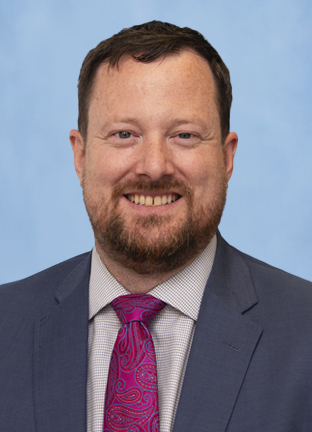
David Odell, M.D., M.S. joins the Department of Surgery as the Section Head of Thoracic Surgery. He completed a thoracic surgery fellowship at the University of Pittsburgh (2013) and his general surgery residency at Harvard/Beth Israel Deaconess (2009) after attending the University of Washington as a medical student (2004) and the University of Puget Sound as an undergraduate (2000). He also completed a master's degree in clinical investigation from Harvard Medical School (2011).
He is a health services researcher and runs an NIH funded lab that studies cancer care delivery. The lab's work focuses on using tools ranging from analysis of large datasets to one-on-one interviews with clinicians and patients better understand the reasons why best practice guidelines are not always followed in the real world in order to develop and implement systems that help ensure patients get the right care at the right time. His clinical specialty is thoracic surgery.
Dr. Odell is a member of the Society of Thoracic Surgeons, the Society of University Surgeons, the ACS among others in addition to being an appointed member of the Commission on Cancer, where he heads the thoracic cancer data standards group. He also leads the ACS/CoC National Quality Improvement Project on lung cancer lymph node staging, the ‘LungNODES ‘ (Node Operative Dissection and Evaluation Standards) project, and he is the Chair of the STS National Mentorship Program, connecting surgeons (at all career stages) with mentors across the country, and the Chair of the Looking to the Future Scholarship Program for the STS, an annual program for medical students and residents to explore careers in CT surgery by attending the annual meeting with a mentor.
Get to know Dr. David Odell
Q. Why Michigan Medicine? Tell us what excites you about being a part of the team.
A. I’m honored to have the opportunity to join what I believe is the preeminent thoracic surgery group in the United States. The surgeons in our group are not only a diverse group of fantastic clinicians, but exceptional people as well. I’m also excited to be joining a department that actively fosters both academic and clinical innovation among its faculty. This is what drew me to academic surgery in the first place and it just seems to be in the water here at Michigan!
Q. Why surgery? Tell us what led you down this path.
A. I had absolutely zero intention of being a surgeon when I went to medical school. I thought I was going to be a geneticist. I quickly realized that I liked working with my hands and the idea of having a technical skillset to pair with an intellectual one really appealed to me as did the immediacy of the problems (and solutions) in surgical practice.
Q. What drew you to your specialty?
A. I’ve always been drawn to the challenge of cancer care, and that’s a lot of what we do in thoracic surgery. However, I think what really cemented this field as a career for me was the clinic. I loved that in thoracic surgery, whether a patient had a lung nodule, or a hiatal hernia; the thoracic surgeon was with them through every step of their journey – from diagnosis to treatment.
Q. What drew you to your research interests?
A. I remember even as a medical student being struck by the variability in health care. It seemed very stochastic to me that based on where a patient happened to live, or whom they happened to see, could have such a big impact on their course of care. There had to be a better way. Traditionally, health care has centered around the hospital or the doctor. We now have the opportunity to reimagine health care models that center around the patient. Making use of expanding health care systems and technologies, like telehealth, to deliver high quality care to more communities. Michigan is the perfect state to bring these models to life given the wide range of geographic and practical barriers many of our patients face in getting care.
Q. What’s a little-known fact about you?
A. I’m a Canadian…by extension. My dad grew up in Medicine Hat, Alberta, and a few years ago Canadian law changed to recognize the children of Canadians who were born outside the country as citizens as well, so I now have dual passports (although I’ve never actually tried to use the Canadian one!).
Q. Favorite procedure and why?
A. I really love minimally invasive lung surgery. There is something really special about having a patient walk into the hospital in the morning with a possible cancer, getting an actual diagnosis in the operating room, and then being able to definitively treat the cancer before the patient even wakes up. Within 24 hours patients can be on their way back home, cancer free.
Q. Favorite way to spend time outside of the hospital or lab?
A. My wife would say the answer should be watching football. However, I would actually say taking our kids hiking; something we are looking forward to doing a lot more of here in Ann Arbor!
